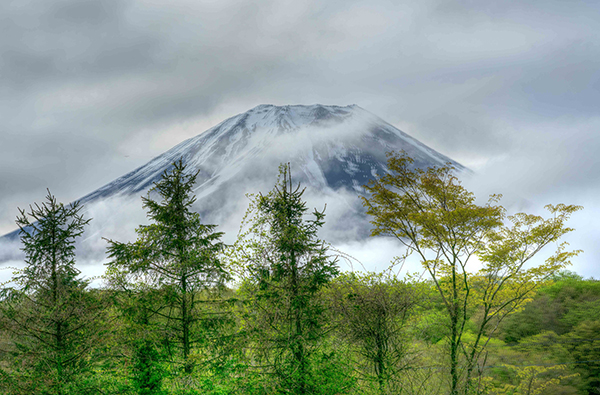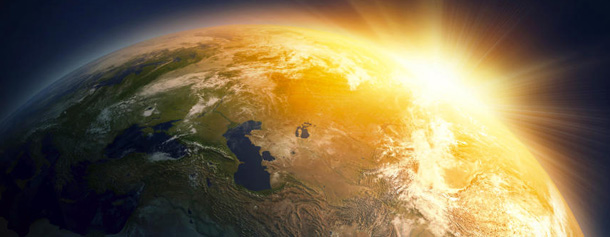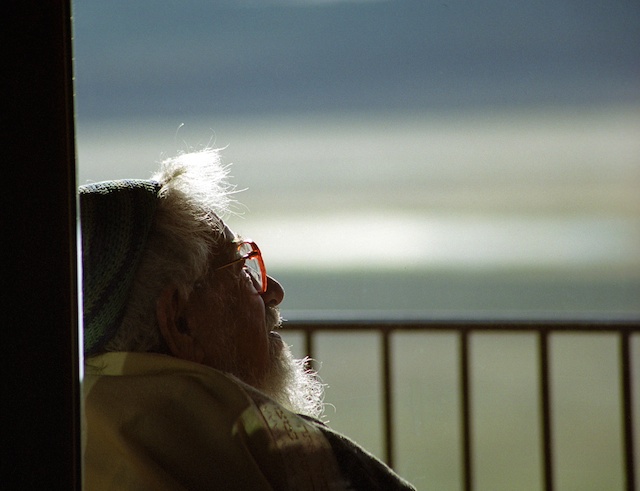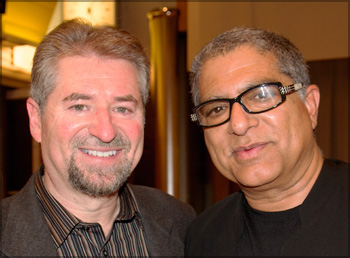by Alan Briskin | Consciousness, Spiritual Intelligence, Video

On May 12, 2017, the Goi Peace Foundation convened a symposium at United Nations University in Tokyo, Japan. The theme, “Co-creating a World in Harmony and Balance” , was an expression of the Fuji Declaration and Soul of WoMen Initiative begun two years earlier.
I have worked with the Goi Peace Foundation for many years and was witness to the development of both the Declaration and Initiative. This symposium brought together thirty-five global leaders to address five perplexing dualities we encounter within a framework of oneness.
We knew there could be no way these leaders would be able to present even a fraction of their work in the world. How could we design a day that held a spark of the greater intention we all felt was possible when too many speeches might deaden the energy of the room? How could we work with an emergent perspective rather than one that focused solely on content? Adding to the complexity, the seating and tables were largely fixed and the symposium sponsors felt strongly that everything spoken should be available to everyone (an audience of about 50 people were in the hall with us) so no breakout sessions were possible.
Read More
by Alan Briskin | Collective Wisdom, Consciousness, Fields

Teilhard de Chardin’s Noosphere: A Field of Consciousness Surrounding Us
The genesis of a great idea can lie dormant for a very long time before ascending into consciousness. For the philosopher, scientist, and theologian Pierre Teilhard de Chardin, it was germinated in the mud of Verdun, France, where, as a stretcher bearer in World War I, he carted the dead and wounded from the front lines. Like Edgar Mitchell, Teilhard had the ability to intuit a greater meaning from his immediate circumstances, to see out beyond the literal front lines to the outlines of a global consciousness.
Journaling during a brief furlough from his duties in war, Teilhard reflected on the paradoxical pressures that soldiers felt between the respite from fighting and the tension of being on the front lines.
Our future continues to be pretty vague, both as to when and what it will be. What the future imposes on our present existence is not exactly a feeling of depression; it’s rather a sort of seriousness, of detachment, of a broadening, too, of outlook. This feeling, of course, borders on a sort of sadness (the sadness that accompanies every fundamental change); but it leads also to a sort of higher joy. . . . I’d call it “Nostalgia for the Front.” The reasons, I believe, come down to this; the front cannot but attract us because it is, in one way, the extreme boundary between what one is already aware of, and what is still in process of formation. (Teilhard de Chardin 1965, 205)
What was being stirred up in Teilhard’s imagination was a profound shift of attention. The months on the front altered his perception. Decades later, he would acknowledge how the concentration of bodies, “the atmosphere of the front,” and the loss of boundaries between “natural” and “artificial” and between “physical” and “moral” inspired within him an epiphany. The human million, as he described it, had within itself a “psychic temperature” and an evolutionary throb. The isolated human being, like an unattached cell, was predisposed to join with others and become a more complex entity, “to coalesce into physical relationships and groupings that belong to a higher order.” Grounded in his scientific knowledge of biological evolution and now acting with a spiritual sixth sense, Teilhard’s capacity for observation was magnified. He described this as a “gift or faculty of perceiving without actually seeing, the reality and organicity [sic] of collective magnitudes . . . what emerged into my field of perception was literally a new universe” (King 1996, 60–61).
Decades before Edgar Mitchell gazed down from the sky and saw a singular planet, Teilhard looked up from the planet’s physical core and saw a web of psychic coherence, like a thin mist, rising above human consciousness. His mind had been rewired to see unity from multiplicity and diversity as elements that make up a larger whole. “Yes,” he wrote in The Phenomenon of Man, “from now on we envisage, beside and above individual realities, the collective realities that are not reducible to the component element” (Teilhard de Chardin 1959, 247).
Read More
by Alan Briskin | Collective Wisdom, Consciousness, Events, Spirituality

I’m a co-signer of the Fuji Declaration, an “international alliance of individuals and organizations who are united by a commitment to live and collaborate toward the advancement of a more harmonious and flourishing world”. I’m flying to Japan in a few days to participate in a ceremony, held at the base of Mt Fuji, to celebrate the inauguration of the Fuji Declaration.
The Fuji Declaration is “a call to all global citizens to recognize and nurture the full human potential and divine spark within the human spirit to catalyze a timely shift in the course of history”.
If you share this calling, come be part of it!
Sign the Declaration, and Register Here to join in the global celebrations on May 17th via live tele-cast.
by Alan Briskin | Collective Wisdom, Consciousness, Spirituality
 Reb Zalman passed over today. I’ve known he has been slowly slipping away and was preparing himself and others for this day. Still, my spirit is heavy, and my gratitude overflowing.
Reb Zalman passed over today. I’ve known he has been slowly slipping away and was preparing himself and others for this day. Still, my spirit is heavy, and my gratitude overflowing.
This is a photograph from a time we had together in Colorado. We were exploring ways to enter states of consciousness that would allow healing energies to be directed to what he called “hot spots” in the world. To do so required joining with other forms of spiritual intelligences and with personal guides both living and dead.
Reb Zalman embodied a curiosity, boldness, brilliance, and warmth that blew sacred breath on the embers of our souls. I am grateful.
Read More
by Alan Briskin | Collective Wisdom, Consciousness, Health, Leadership, Poetry, Spirituality, Wellness
A poem based on phrases and fragments of a speech* given by Deepak Chopra:
My grandchildren are here today
the most important part for me.
Here is my question:
What if consciousness
was not
a byproduct of our brain?
What if instead
it is the ground of Being,
the basement of the Universe
in geometric space-time
where all co-exists
as possibilities.
The great Rishi wisdom teachings
tell us consciousness
cannot be imagined
but makes the imagination possible.
Can you imagine?
From the basement of space-time,
everything is born from a quantum vacuum,
Beauty, Truth, Love, Joy, Compassion,
and also our Diabolical Self.
There is only the collective mind
that shows up as the individual mind.
The sage plunges into it,
expresses it, becomes one with it.
Healing is nothing more than
the memory of wholeness
Nature can say that the
human species
was just an experiment
that didn’t work out
Or Not!
The frantic search for security
only reinforces the insecurity.
Surrender to the mystery
of the divine,
which is constantly on the move.
My grandchildren are
here today,
the most important part.

* Deepak Chopra’s speech, on which this poem was based, was given on the day he received the Goi Peace Award** in Tokyo, Japan, November 8th, 2010.
I was there as a moderator the following day for a panel discussion with Deepak and thought leaders from Japan on the subject of death and dying, and wrote the poem from fragments of his speech and the group conversation.
The mission of the Goi Peace Foundation, which sponsored both events, is to bring people together in wisdom, united in their hearts toward the common goal of peace on Earth. By encouraging public awareness and building cooperation among individuals and organizations in all fields, they aim to build an international peace network and stimulate the global trend toward a culture of peace.
by Alan Briskin | Collaboration, Collective Folly, Collective Wisdom, Conflict, Conscious Capitalism, Consciousness, Politics

A serial journal of cogent reflections and irreverent insights on the social effects of capitalism and the roots of partisan politics. Pairing prose with HDR photography and “flash points” drawn from current and historical perspectives, the author seeks to recover lost wisdom and courageous action beyond the shouting and noise of today’s headlines.
Chapter Sixteen
The Dark Prophet
Part II: Capitalism’s Shadow
Time Range: 1867-1883, 2012
It is easy to dismiss Marx as a revolutionist or even as a theorist of socialism, but much harder to ignore his warnings about capitalism. He had discovered the Achilles’ heel of economic arrangements that celebrated their ability to create prosperity, generate innovation, and provide a bounty of goods and services as well as jobs. Capitalism proclaimed itself the final act in the history of economic evolution. Marx refuted the claim. His diatribes, as painful and polarizing as they were, force us to become conscious of capitalism’s other consequences.
We are confronted with capitalism’s shadow, the dependence on jobs defined solely by the marketplace, the depletion of natural resources, and the addiction to material gratification and personal glory out of sync with spiritual, community, and personal growth.
Yet, for all these dark prophecies, they are still within the imagination to address. There is ample evidence of the power of human collaboration combined with science and social purpose to tackle even the most difficult social issues. The darkest prophecy that Marx left us was not about economic concentration, ecological destruction, or the effects of inequality. It was about ourselves. It was about human polarization, the nature of privilege, and feelings of revenge – things Marx understood deeply in his bones.

HDR (High Dynamic Range) Photography by Alan Briskin: multiple shots at different exposures are combined into one image in order to show “more of what’s there”.
His prophecy of successive business crises, continual warfare between nations, depletion of the earth’s resources, and mounting cynicism among the middle and lower classes was all predicated on the belief that government would do nothing about it. He believed that government would be a protector of the dominant classes — even as the dominant classes battled each other — or at best impotent, paralyzed to do anything significant about the crises that would unfold in waves.
Government officials railed Marx, in tones similar to a tormented Dr. Seuss, could not, would not stand up to the monied interests that supported their rise to political power and punished these same politicians if they deviated too sharply from the social narrative of economic growth. And that narrative was synonymous, questionable as it was, with progress, social good, and most critically the belief that money should never lie fallow but grow through investment, resulting in individual wealth accumulation. The hero’s journey, in capitalist mythology, overcame hardship in order to gain material wealth. And in gaining wealth gained wisdom and character. If only it was true.
Marx, often unkind, jealous, suspicious, even wrathful, staked his entire claim on the inability of individuals and social groups to see the predicament they were in. There could be no genuine conversation about altering the rules of capitalism in any significant way. Was he correct?
There is a final irony in all this. Capitalists and workers alike would follow the psychological script Marx laid out while believing they opposed his ideas. As groups on the right and left organized to battle the perceived dangerous actions of the other, they were fulfilling Marx’s prophecy. As unions became more organized, aggressive, and even violent in the early 20th century, they were following exactly Marx’s claim that capitalism would spawn its own detractors as workers learned to leverage their power. As certain capitalists fought against living wages for workers, initiated offshore production to increase their surplus value, and battled regulations for protecting the safety of workers as well as the environment, they were fulfilling Marx’s interpretation of how a ruling class would operate. As governments swung from welfare programs to austerity policies, their basic incompetence or incapacity to act was revealed.
Marx’s assumption was that individuals were not free to think beyond the shackles of their immediate self-interest. Given the structure of profit making, Marx asserted that individuals would choose to maximize their gain at the expense of others, regardless of the consequences. This makes nearly everyone operating within the capitalist system Marxist — at least in behavior. If there was an exception to his declaration about the lack of human agency, it was himself. Confounding his followers, he declared a few years before his death, “I am not a Marxist.”








